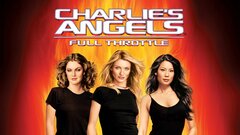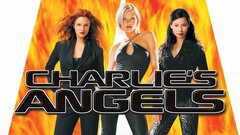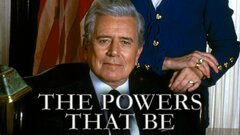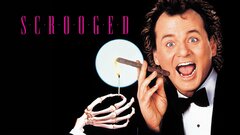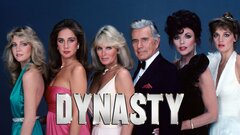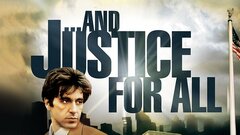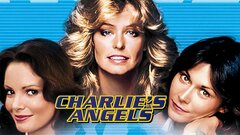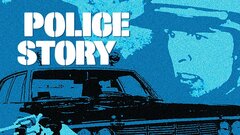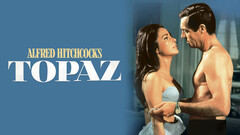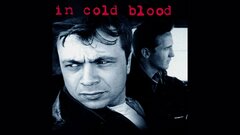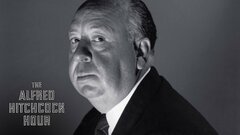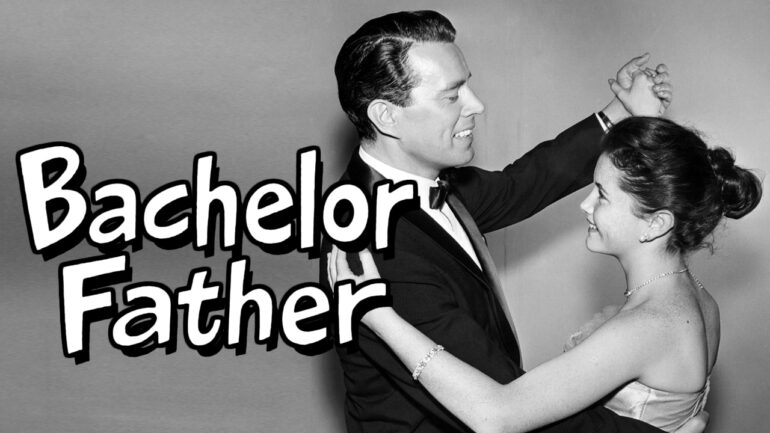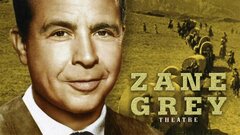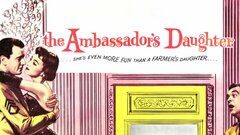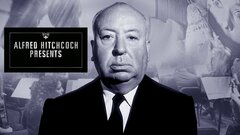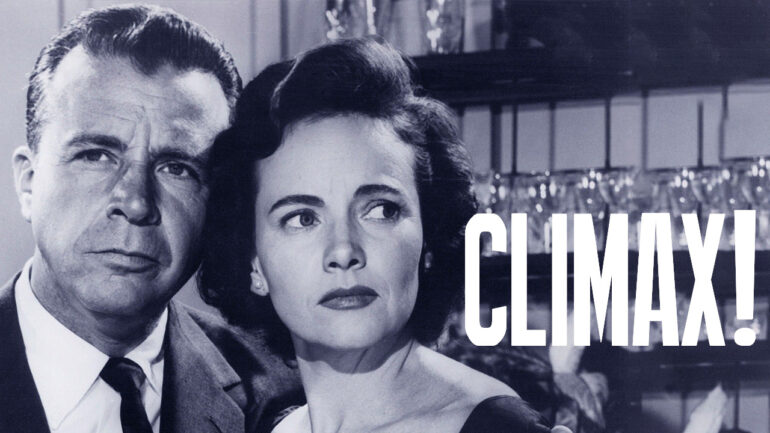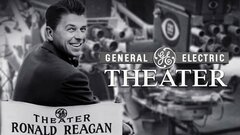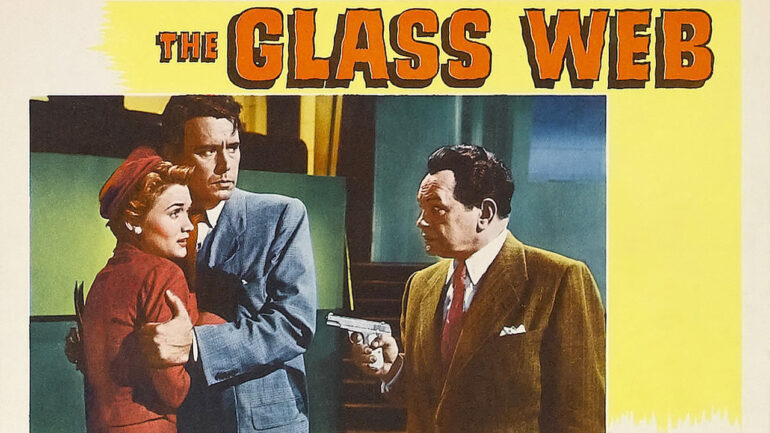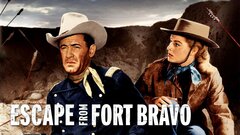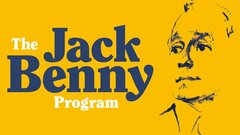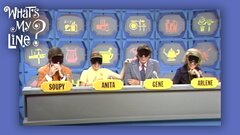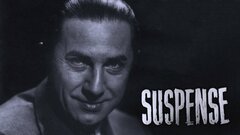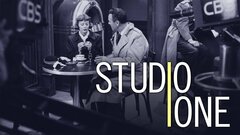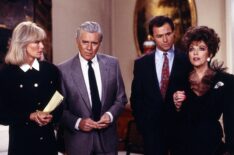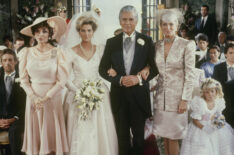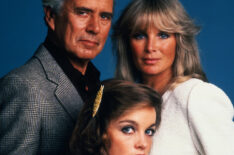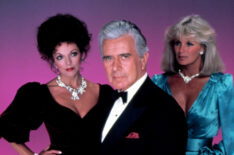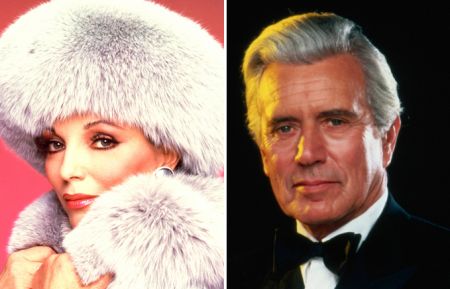Nearly as recognizable for his elegant, deliberative baritone voice as his silver-mane and WASPy visage, John Forsythe built a career as an unassuming TV everydad and a reliable and, by his own reckoning, "workmanlike" actor, before becoming one of biggest names in show business in the 1980s. Forsythe imprinted his star in the pop culture firmament in ratings-topping 1970s and 1980s "campy" television institutions "Charlie's Angels" (ABC, 1976-1981) and "Dynasty" (ABC, 1981-89), but he arrived there with a long background on New York stages, including the distinction of being an original member of New York's now-renowned Actor's Studio, and prolific work at the dawn of the TV age.
At the height of the success of "Dynasty," he came to be the medium's face of the opulence and excesses of go-go 1980s America, even as he long remained humble to a fault as to his own mark on his trade.
He was born John Lincoln Freund in Penns Grove, NJ, on Jan. 29, 1918, the first of three children of Blanche and Jeremiah Freund who would spend their early years as a family in the Garden State. His father, a "straight-laced, stiff [and] autocratic" man, Forsythe later said, worked for the chemical giant DuPont, but eventually netted a job as a Wall Street broker and moved the family to Brooklyn, NY.
When the market crashed in 1929, however, times got much tougher, and Forsythe later recalled his white-collar father winding up "digging ditches" to help make ends meet. Growing up, John developed an affinity for Buck Jones cowboy movies, but never imagined a life in show business. Attending Brooklyn's Abraham Lincoln High School, he came of age, like countless Brooklyn youngsters, a fan of the Brooklyn Dodgers and devoted his extracurricular activities to sports. When he graduated at just 16 years old, he earned a partial scholarship to the University of North Carolina to play baseball.
At UNC, he majored in English literature, and when he returned to New York after school, at just 18, his distinctive voice earned him a foot in the door of the career he did foresee for himself - a job as an announcer for the Dodgers at Ebbets Field. He effectively apprenticed under Red Barber, the seminal sportscaster who called radio play-by-play for Dodgers games, and would spell Barber for short stretches during games.
In fact, when Barber refused, Forsythe wound up calling the infamous gimmick event at Ebbets that pitted Olympic gold-medalist Jesse Owens against a thoroughbred horse in a race around the infield. But the baseball season lasted only half a year and as Forsythe later recalled, "I like to eat in the wintertime," so by happenstance he began picking up other radio work, including on-air plays and soap operas. His clean-cut, square-jawed good looks also helped him pay the rent with modeling work, including a stint for the Sears catalog.
After only two and a half years at Ebbets, he quit to make a go of his accidental acting career, changing his name to the more marquee-friendly John Forsythe. Though his effervescent mother supported her son enthusiastically, the tack did not sit well with his conservative father, who had envisioned a more respectable career for his son.
After a few years of minor projects typical for a young actor (and a brief early marriage), Forsythe scored his first Broadway job in 1942 - a supporting role to Jose Ferrer in the play "Vickie," which earned him initial attention from Hollywood. Warner Bros. made him a contract player at about $100 week, which snared him a couple of bit roles in the next year's productions of "Northern Pursuit" (1943) and "Destination Tokyo" (1944).
He also met his future wife, actress Julie Warren, who soon made her own Broadway debut in a production of "Around the World in 80 Days." World War II intervened in his career, but only briefly, as the U.S. Army Air Corps deemed Forsythe's vision subpar for flying planes, as he had hoped to do. Instead, his thespian background forwarded him into a major propaganda project. The corps produced renowned playwright Moss Hart's "Winged Victory," an ensemble tale of American soldiers and their wartime sacrifices, and Forsythe found himself cast with fellow luminaries-in-uniform Red Buttons, Mario Lanza, Gary Merrill and Karl Malden.
Opening in Boston, MA, in the fall of 1943, the play moved on to New York for a 226-performance run at the 44th Street Theatre, before hitting the road for another 445 performances across the country through the end of the war. Before mustering out, Forsythe also lent his lingual skills to rehabilitative speech therapy programs for shell-shocked pilots.
Returning to New York a private citizen, Forsythe in 1947 became one of the original members at the Actor's Studio, the cauldron of method acting founded by Elia Kazan and others who vaulted him into their upper echelon class with such talents as Marlon Brando, Montgomery Clift and Patricia Neal. He stood out as the more straight-laced member of the arty cohort such that some of his friends would dub him the "Brook Brothers Bohemian."
Those early associations would inform a manifest humility about his own talents that Forsythe would articulate for years after, but he steadily built his own bona fides on the stage and in the new medium of television, just beginning to fill out its content with one-off teleplay productions. That same year, he earned a major role in Arthur Miller's first Broadway play, "All My Sons," directed by Kazan, and in 1950 he was chosen to replace Henry Fonda in the title role of "Mr. Roberts."
Meanwhile, Forsythe became a revolving player in the raft of network TV anthology series then being produced in New York, such as "Kraft Television Theatre" (NBC, 1947-1958), "Ford Theatre" (CBS, 1948-1951), "Robert Montgomery Presents" (NBC, 1950-57), The Philco Television Playhouse" (NBC, 1948-1955) "Suspense" (CBS, 1949-1954) and "Schlitz Playhouse of Stars" (CBS, 1951-59).
His work regained Hollywood's attention, and in 1953 Universal gave him his first feature lead role in the light comedy "It Happens Every Thursday" (1953), followed by a role opposite Edward G. Robinson in the "The Glass Web" (1953), a curious early venture into 3D. Neither set the box-office on fire, but back in New York, he got in on the ground level of a major hit, originating the role of Captain Frisby in the Broadway production of "Teahouse of the August Moon," which went on to run for over a thousand performances.
That same year, he was nominated for his first Emmy for his anthology work. In 1955, Forsythe netted the attention of another prestigious denizen of the cinema, Alfred Hitchcock. In "The Trouble with Harry" (1955), Hitchcock cast him as Sam Marlowe, the quirky, sarcastic Bohemian artist in a quaint New England town, whose oddball ensemble of citizens (including Shirley MacLaine in her first film role) find themselves baffled at a dead body (Harry) found lying at its outskirts. Film buffs would later deem the offbeat black comedy a noble experiment far ahead of its time, but at the time it confounded movieg rs expecting Hitchcockian murder and suspense and proved the director's first major flop.
Despite this, Forsythe forged ahead with his TV playhouse work and established his star status enough for CBS to make him the central figure in an upcoming situation comedy, "Bachelor Father" (CBS/NBC/ABC, 1957-1962). While generally blending in with the myriad, mild-mannered family comedies of the period, the premise differed in that Forsythe's character, wealthy Beverly Hills lawyer Bentley Gregg, assumed guardianship of his niece Kelly (Noreen Corcoran) after the death of her parents, making his cosmopolitan man-about-town more "hip" and empathetic to her teenage foibles than typical suburban TV dads. He later said that many of his fan letters came from teenage girls praising his fathering skills and asking his advice. Curiously, in one episode, his later "Dynasty" co-star, a young Linda Evans, played one of Kelly's teenage friends with the hots for Bentley.
Forsythe spent much of the rest of the 1960s in the familiar territory of anthology series, peppered with occasional feature and made-for-TV movie roles and a couple more shots at series TV. In 1962, he reprised his "Teahouse of the August Moon" role in a broadcast of "The Hallmark Hall of Fame" (CBS, 1951- ). In 1964, he starred opposite Ann-Margaret in "Kitten With a Whip" as a square suburban politician playing a cat-and-mouse game with a gang of oddly preppy beatnik sociopaths - a film so cheesy and dated that years later it was featured on Comedy Central's bad-movie-eviscerating cult series, "Mystery Science Theater 3000" (1989-1996). His next series, "The John Forsythe Show" (NBC, 1965-1966), set him as a former Air Force officer running an all-girls school, at least for the first half of its lone season, after which his character is reactivated into government service as a globetrotting secret agent.
In 1967, he got third billing in Richard Brooks' moody adaptation of Truman Capote's new journalism masterpiece In Cold Blood, playing the pivotal role of the intrepid investigator Alvin Dewey. He reunited with Hitchcock on the Cold War thriller "Topaz" in 1969, and that same year, took another shot at sitcom work in "To Rome with Love" (CBS, 1969-71), another fluffy family show about an Iowa widower who seeks to make a fresh start with his daughters in Rome.
The 1970s would make Forsythe's distinguished voice recognized near universally in the realm of popular culture. While he busied himself with a heavy schedule of TV movies after "To Rome with Love" ended, he also scored a regular stint as the narrator of the syndicated nature series "The World of Survival" (1971-77). Then, in 1976, he would earn the highest profile project of his career, basically by getting out of bed in the middle of the night.
Producer Aaron Spelling had been pitching ABC a show, "Charlie's Angels," about three attractive female private detectives who worked for a mysterious boss, but ABC execs had scoffed at it - one of them, later Disney chairman Michael Eisner, by one report calling it "the worst idea I've ever heard." After spending a year nuancing the concept, ABC greenlit a pilot, but the project hit another roadblock just as Spelling was readying the test episode to send to ABC headquarters in New York. As Forsythe later recounted in an oral history, Spelling called him at home at around 11:30 pm on a Friday night and quickly recounted his w : Veteran actor Gig Young had been hired to voice the role of the disembodied Charlie Townsend - who gave directions to his "Angels" via speaker phone but remained unseen even by them - but turned up drunk when they needed to put his voiceovers on tape. It was the last element to complete the pilot. Spelling asked if he could come down and read the lines.
By the late 1970s, Forsythe began suffering bouts of fatigue. Seeking medical help, he discovered he had a congenital heart defect. A longtime cigarette smoker, he had been having circulation problems, and with the dangerous condition diagnosed, doctors advised a drastic fix: quadruple bypass surgery.
He bounced back quickly and within a few weeks was taping his breezy banter with the Angels, and taking on arguably his most memorable movie role. Forsythe was initially wary about the supporting but pivotal part of Judge Henry Fleming in director Norman Jewison's "And Justice for All" (1979), as it flew in the face of his longtime image as an amicable square, but he decided to take the gamble. The black comedy/drama about the New York justice system saw him playing a harsh law-and-order judge who hires his in-court nemesis (Al Pacino) to defend him against a violent rape charge, to which, late in the film, Forsythe's character confesses in a bone-chilling display of sociopathic, cold-blooded arrogance. The role, he said later, raised so many eyebrows that he soon after received three or four more offers to play "heavies," which he declined, considering such roles "not my milieu."
By 1981, "Charlie's Angels" lost its sparkle and much of its audience, with ABC cancelling it after the 1980-81 season. But Spelling, partnering with producer-writers Richard and Esther Shapiro, would next hatch a vehicle that would bring Charlie in front of the cameras. Ever-riding TV's shifting tides, the hitmaker behind the "Love Boat" (ABC, 1977-1987) and "Fantasy Island" (1978-1984), in 1982 brought to ABC a wholecloth construct of the Reagan era, entitled "Dynasty." The show followed the affairs and schemes of a wealthy Denver oil family, the Carringtons.
ABC, seeing the project as its star-studded answer to the then-reigning nighttime soap opera, "Dallas" (CBS, 1978-1991), gave the go-ahead to what would become a moving stereotype of neo-Gilded Age of the 1980s. The producers cast George Peppard as the lordly, controlling, sometimes tenderhearted patriarch of the clan, but six days into the shooting of the pilot episode, they found him balking at flushing out the darker, more draconian side of Blake Carrington. Spelling made another eleventh-hour bailout call to Forsythe, this time to take the lead in a show. Debuting as a mid-season replacement in January 1981, "Dynasty" introduced Blake struggling to balance his corporate empire and new marriage to lovely but fish-out-of-water former secretary Krystle (Linda Evans) with the travails of rebellious daughter Fallon, openly (and, to Blake, scandalously) gay son Steven and conniving oil baron competitors.
It became a moderate hit, placing No. 20 in the primetime Nielsen ratings in its first season. But the next year, Joan Collins joined the cast as Blake's sultry, villainous first wife Alexis, and with their icy on-air feud and chess game of machinations, the show vaulted to No. 5 in season two, No. 2 in the 1984-85 season and, by the end of the next season, "Dynasty" unseated "Dallas" for the No. 1 ranking in broadcast television. Forsythe gathered a passel of awards recognition and high-profile ink, winning Golden Globes for Best Actor in a Drama in 1983 and 1984 and Soap Opera Digest's similar award in 1984.
Forsythe, entering his late sixties, became an unlikely sex symbol, even becoming the male face of a Carrington line of fragrances created by designer Yves St. Laurent. Still, "Dynasty" was littered with stock-in-trade camp and preposterous plotlines, highlighted by a Season five-capping wedding of Alexis's daughter to a prince of a fictional "Moldavia," which gathered most of the major characters for the regal ceremony just in time for a revolutionary uprising.
Forsythe's character survived the massacre, along with a coma, amnesia, blindness, Alexis's brief takeover of his company and a run for Colorado governor, against Alexis - just a few of his handful of trials - before being shot in the final episode. The latter was meant to be a Season nine cliffhanger, but the show, as Forsythe admitted later, had grown stale. With "Dynasty" falling out of Nielsen's Top 30 in its final two seasons, ABC axed it.
Much of the "Dynasty" cast reunited in a 1991 miniseries, "Dynasty: The Reunion," which found Blake Carrington alive and healed. It was critically lambasted and frowned upon by purists who spotted an almost comic number of glaring continuity errors. Forsythe returned to series TV briefly the next year in a sitcom created by Norman Lear, "The Powers That Be" (NBC, 1992-93). He played a hapless veteran U.S. senator ill-equipped to cope with the dog-eat-dog political climate in Washington, DC, but surviving by way of the counsel of his offbeat combination of advisors and his dysfunctional family. NBC, however, buried the show in a Saturday night time-slot and it did not make a second season.
After that, Forsythe effectively retired to an idyllic 30-acre ranch north of Santa Barbara, CA. On Aug. 15, 1994, his wife Julie felt fatigued in the middle of the day and went to lie down. She dozed off reading a book, and when Forsythe tried to rouse her later, he could not. Rushed to a local hospital, she lapsed into a coma and Forsythe was forced to take her off life support.
In 2000, Columbia Pictures offered Forsythe a reported $5 million to bring his voice out of retirement to reprise his role as Charlie in its two slick movie retreatments of "Charlie's Angels" - "Charlie's Angels" (2000) and "Charlie's Angels: Full

